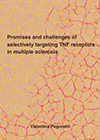PhD defence Valentina Pegoretti
| When: | Tu 14-01-2025 at 14:30 |
| Where: | Academy Building & online |
Valentina Pegoretti (Neurobiology/UMCG)
Promotores: Prof. U.L.M. Eisel, Prof. J.D. Laman (UMCG); copromotor: Dr W. Baron (UMCG)

Promises and challenges of selectively targeting TNF receptors in multiple sclerosis
This thesis investigates the therapeutic potential of selectively modulating Tumor Necrosis Factor (TNF) receptors (TNFRs) as a treatment strategy for multiple sclerosis (MS), a chronic autoimmune disease affecting the central nervous system (CNS). Current therapies for MS inadequately address the complex interplay between inflammation and neurodegeneration, particularly in progressive MS. The research focuses on the selective targeting of TNFR1, which is associated with inflammation and apoptosis, and TNFR2, which promotes immune regulation and tissue protection.
The studies reported in this thesis employ disease models in mice such as experimental autoimmune encephalomyelitis (EAE) and cuprizone-induced demyelination models. The effects of a TNFR1 antagonist and TNFR2 agonist, both individually and in combination, were explored on paralysis symptoms, demyelination, peripheral and CNS immune responses. The findings demonstrate that combining TNFR1 blockade with TNFR2 stimulation reduces EAE symptoms and demyelination, whereas single treatments modulate adaptive immune responses in and around the CNS. Furthermore, single dose TNFR2 stimulation following cuprizone-induced demyelination accelerates remyelination, resulting in lasting effects on the regeneration of myelin sheaths.
We conclude that selective TNFR modulation holds significant therapeutic promise for MS, offering a novel approach to reduce inflammation, enhance remyelination, and improve patient outcomes. However, further investigation is warranted to optimize treatment timing and dosing, as well as to explore the long-term effects of TNFR2 stimulation. This research contributes to the broader understanding of TNF-TNFRs signaling and its clinical implications, offering a new perspective on MS therapy.
